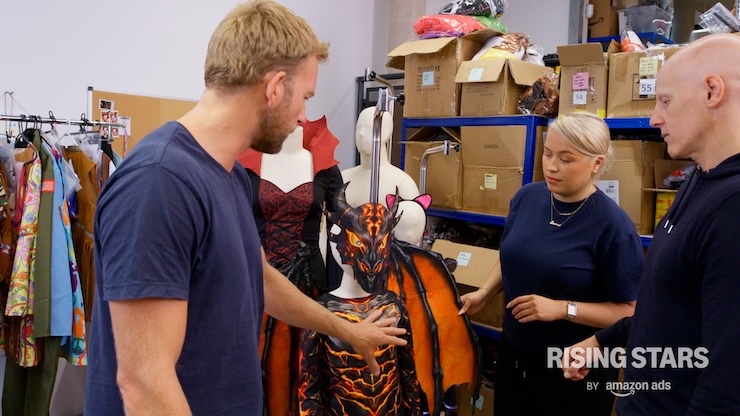Confitex, my absorbent undergarment company, originated out of a love for alpine ski racing and high-performance sports. Myself and company co-founder and designer Frantisek Riha-Scott, both avid alpine ski racers, initially set out to develop new technology for the sports underwear market. We recognised that while there had been a great deal of development in athletic clothing technology, little had been focused on perhaps the most important part – underpants!
A key turning point in our journey as a functional underwear company came when we shared our idea with loved ones. Our product’s purpose and the mission of the company changed dramatically based on their feedback. What our friends and family revealed to us was that they experience varying degrees of incontinence – an issue that effects fully one in three women and one in ten men worldwide (between 340-520 million people) – and that a significant marketplace need exists for fashionable functional underwear. Armed with these personal testimonials, we set out to gather as many insights as possible from anyone who was prepared to share their stories with us and test early prototypes.
Envisioning what was needed from a functional point of view, we embarked on the research and development phase. During this process of textile development we sought out new underwear construction methods and textile technology. Confitex undergarments, which are machine washable and last as long as normal underwear, feature three-layer technology that transfers the moisture away from the body, absorbs it, and features a waterproof outer layer which breathes. This patented design is vitally important because disposable diapers are an environmental nightmare, comprising as much as 15 per cent of total landfill waste and taking up to 500 years to biodegrade.
The power of early adopters
Through this process we found that early adopters are gold. Wherever they come from and whoever they are, we love getting feedback, whether positive or negative. We listen, we learn, and we improve as a result. Initially getting feedback, however, is a scary process for any new business owner. It takes time to grow confidence in what you’re doing. Believing is key. So long as you are honest with yourself and those around you and accept that first time round you’re never going to get it 100 per cent right and realise that everything is an evolution, then you’re probably off to a good start. The key is to take the leap of faith in the first place and be willing to change and quick to respond.
One unique aspect of the early years of our business story is that we did everything ourselves. We were not part of business incubators. We developed the technology ourselves through trial and error in a small basement unit, found our own manufacturing facilities in China, carried out our own QC, and when we first started trading, it was the ‘C-suite team’ that was answering the phones. The company was bootstrapped from our own money and sweat equity from day one. Friends and family investors put up the initial capital to fund the first manufacturing and until recently the company cash flowed its growth as we refined the business model and go-to-market strategy.
Having little or no money to start a business gives you incredible focus. It makes you work smarter and faster, and helps you quickly prioritise what is and isn’t essential. In our case, it also meant that in the early days of operation any mistakes or wrong turns we made were relatively small in cost and impact. No one before had done what we were attempting; the incontinence underwear market to-date had been dominated by ugly, environmentally unsound disposable pads and diapers, so there were no pioneers to look toward to learn from their inspirations and mistakes. We were attempting to build a product, a brand, a business, and a category from scratch.
A baptism of fire
Initial strategy and direction came from existing available market data, some educated guesses, gut feeling, and instinct. Some choices were right, others wrong, but none resulted in total calamity. This baptism of fire resulted in a stronger, leaner, meaner, and more experienced team that can now capitalise on key learnings as we begin to grow the company to scale.
We learned as we went in respect to market validation, size of market, and target audience as well as perfecting the technology, filing patents, and establishing a robust and scalable supply chain. Once these elements were in place, the next challenge was how to take our products to market given sensitivities surrounding incontinence, and lead the way in creating a new category and demand for a product and brand people had not seen before. And we’re having fun doing it! In a world first, Confitex showcased its designer incontinence lingerie on the runway at the New Zealand Fashion Week in August 2015, including the first G-string designed for light incontinence.
Almost two years later, we’re aware of the challenge in our key markets to convert existing users and attract new entrants but market up-take has been faster than expected. The market is growing at 6-7 per cent per annum with a huge wave of baby boomers entering retirement age that are looking for quality products to help them continue to live active lives with freedom, confidence, and independence.
We are positioning the business as a lifestyle apparel company recognising that as many people under 65 years old as over 65 experience incontinence. Our customers have a lot of living to do and are looking for solutions to help. The world’s greatest investor, Warren Buffet, has sage investment advice: buy stocks of companies you like, whose products and services you understand. A similar rule might apply for entrepreneurs looking to start a business: make products you need, that you yourself would use.
Dr. Mark Davey is co-founder and CEO of Confitex.





